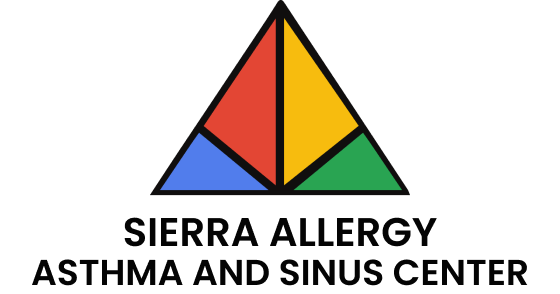As a parent, it can be overwhelming when your child isn’t feeling well, especially if you suspect they might have allergies or asthma. Knowing how to differentiate between a common cold, seasonal allergies, or asthma can help you provide the right care for your child and ease their discomfort. In this guide, we’ll help you understand the key symptoms of allergies and asthma, when to seek help from an allergist or asthma specialist, and what steps to take for diagnosis and treatment.
What are allergies?
Allergies occur when the body’s immune system overreacts to harmless substances like dust, pet dander pollen. These triggers, also known as allergens, can cause a range of symptoms from mild to severe. Children with allergies may experience discomfort that affects their day-to-day activities, making it important to recognize the signs early on.
Symptoms of allergies in children
Allergy symptoms can vary from child to child, and sometimes they might mimic other conditions like colds or sinus infections. However, there are some telltale signs that can help you figure out whether your child might have allergies. These include:
Frequent sneezing
If your child seems to be sneezing constantly, especially during certain seasons (spring or fall), it could be a sign of seasonal allergies.
Runny or stuffy nose
Unlike a cold that clears up in a week, a persistent runny or congested nose that lingers could indicate allergies.
Itchy or watery eyes
Children with allergic reactions often rub their eyes frequently because of itching, and their eyes might appear red or watery.
Coughing or throat irritation
A dry, persistent cough, especially when accompanied by other symptoms like sneezing or a runny nose, may suggest allergies.
Skin rashes
Red, itchy patches on the skin, also known as hives or eczema, can be a reaction to allergens in the environment or food.
What is asthma?
Asthma is a chronic respiratory condition that affects the airways, making it hard to breathe. It’s a common condition in children and can range from mild to severe. Many parents worry about asthma, especially if their child experiences frequent coughing, wheezing, or shortness of breath.
Symptoms of asthma in children
Recognizing asthma symptoms in children is essential to managing the condition and preventing complications. Some common symptoms to look out for include:
Frequent coughing
If your child has a persistent cough, especially at night or after physical activity, it might be a sign of asthma. This is often one of the earliest symptoms parents notice.
Wheezing
A whistling sound when your child exhales can be a classic sign of asthma. It indicates that their airways are narrowing, making it harder for them to breathe.
Shortness of breath
If your child becomes easily winded or out of breath, even during mild physical activities like running or playing, it could suggest asthma.
Chest tightness
Children with asthma often describe feeling like something is squeezing their chest, making it uncomfortable to breathe.
Fatigue or difficulty sleeping
Breathing difficulties, especially at night, can disrupt sleep and leave your child feeling tired and irritable during the day.
The difference between allergies and asthma
It can be difficult to tell whether your child is dealing with allergies, asthma, or a combination of both, as some symptoms overlap. However, there are a few notable differences:
- Allergies primarily affect the nose, eyes, and skin. Symptoms like sneezing, runny nose, and itchy eyes are more common with allergies.
- Asthma affects the lungs and airways. Symptoms like wheezing, shortness of breath, and chest tightness are more likely to indicate asthma.
Sometimes, allergies can trigger asthma symptoms, leading to what is known as allergic asthma. If you suspect that your child has both conditions, it’s crucial to consult an allergy immunologist or an asthma specialist for an accurate diagnosis.
When to see an allergy specialist or asthma specialist
If your child is frequently showing symptoms of allergies or asthma, it’s a good idea to consult with an allergist or asthma specialist. These professionals specialize in diagnosing and treating allergies and asthma, helping your child manage their symptoms and live more comfortably.
Here are some situations when you should seek help from a specialist:
Symptoms are persistent
If your child’s symptoms don’t seem to improve or keep coming back, it’s time to consult a specialist.
Over-the-counter treatments aren’t helping
If you’ve tried allergy medications or asthma inhalers without success, a specialist can recommend a more personalized treatment plan.
Symptoms are affecting daily life
If your child’s allergies or asthma are interfering with school, sleep, or play, a specialist can help manage the condition and improve their quality of life.
What to expect from a visit to an allergist or asthma specialist
When you take your child to see an allergy or asthma specialist, they will likely conduct several tests to diagnose the condition. Here’s what you can expect:
Medical history
The doctor will ask about your child’s symptoms, when they occur, and if they’re related to specific triggers (like pets, dust, or exercise). They’ll also inquire about any family history of allergies or asthma.
Physical examination
The health professional will examine your child’s nose, throat, and lungs to check for signs of allergies or asthma.
Allergy testing
This could include skin prick tests or blood tests to identify specific allergens your child might be reacting to.
Breathing tests
For asthma, the doctor may perform spirometry, a test that measures how well your child’s lungs are functioning.
Treatment options for allergies and asthma
The good news is that allergies and asthma can both be effectively managed with the right treatments. Your allergist or asthma specialist will create a personalized treatment plan based on your child’s diagnosis. Here are some common options:
Allergy medications
Antihistamines, nasal sprays, and eye drops can help reduce allergy symptoms. In some cases, allergy shots (immunotherapy) may be recommended to help your child’s body build tolerance to specific allergens.
Asthma medications
Inhalers (bronchodilators) are commonly prescribed for asthma to help open the airways and make breathing easier. Your doctor may also prescribe daily controller medications to manage asthma over the long term.
Avoiding triggers
One of the most effective ways to manage allergies and asthma is to identify and avoid triggers. This could mean keeping windows closed during pollen season, using air purifiers, or making changes in your child’s diet if food allergies are involved.
Conclusion
Parenting a child with allergies or asthma can be challenging, but you don’t have to navigate it alone. Consulting with an allergist or asthma specialist will provide you with the knowledge and tools to help your child thrive. Remember, early diagnosis and proper management can make a huge difference in your child’s overall health and well-being.





